Tasks: A Small Step for ChatGPT, a Giant Leap Toward Agentic AI
OpenAI’s new “Tasks” feature for ChatGPT might look like a modest update on the surface—just a way to schedule reminders or routine actions. But if you read between the lines, it’s a signal that AI is inching closer to becoming a proactive assistant rather than just a chatty companion. Think of it as an early stage in the evolution from “AI that reacts” to “AI that acts.”
What Exactly Is “Tasks”?
Tasks is a scheduling tool built right into ChatGPT. It lets you set reminders or actions at specific times, whether you want a daily weather report at sunrise, a weekly news brief on Mondays, or a recurring joke to lighten the mood at the end of your workday. Currently, it’s available to ChatGPT Plus, Team, and Pro subscribers, with a limit of ten active tasks. The idea is simple: ChatGPT is no longer waiting around for you to type a question—it’s stepping in to proactively help (within reason).
Why This Matters
This seemingly small feature hints at the broader push toward AI systems that can autonomously carry out tasks, anticipate needs, and tackle more complex workflows. Where ChatGPT used to answer questions reactively, it can now nudge you with reminders or handle recurring updates with minimal oversight. That’s a baby step, sure, but it sets the stage for a new class of “agentic” AI tools that could handle entire processes end-to-end.
Meet “Operator”: AI on Autopilot
While Tasks offers a glimpse of proactive AI, OpenAI has a more ambitious project in the wings: Operator. Slated for launch in January 2025, Operator is designed to revolutionize how users interact with computers—and perform everything from coding and travel booking to online payments and email management. Here’s a quick overview:
• Launch & Availability: Operator will initially be released as a research preview and made accessible through OpenAI’s API, giving developers a chance to test and integrate it.
• Key Capabilities: Imagine an AI assistant that can write software code, navigate the web, book flights and hotels, handle online transactions, and even organize your email inbox. Operator’s goal is to tackle these tasks autonomously, requiring only minimal user guidance.
• Performance & Benchmarks: Early tests show promising skill at web navigation—sometimes even outpacing human users—but more complex jobs like setting up cloud services or creating Bitcoin wallets still have limited success rates.
• Security & Development: OpenAI has grappled with safety challenges, including “prompt injections,” which could trick the AI into performing unintended actions. In response, the company is beefing up security protocols to protect against data breaches and malicious exploits.
• Industry Impact: Similar “AI agent” initiatives are also in the works at Microsoft, Google, and Anthropic. But Operator stands out as a concerted leap toward AI that can manage multi-step tasks without constant human checks. If successful, it could reshape how businesses think about automating their workflows.
Operator remains under wraps for now, but anticipation is high. With a name that suggests it’s ready to “operate” on your behalf, it might just become the go-to agent for handling everything from your morning coffee order to the next big project launch.
What This Means for Your Business
On a practical level, features like Tasks (and the upcoming Operator) can lighten the load on teams by automating repetitive or time-consuming work. You could theoretically have AI scheduling stand-ups, preparing weekly sales summaries, or even scanning the web for key industry insights. As the technology matures, expect it to take on bigger responsibilities, such as drafting legal documents or managing parts of product development pipelines.
However, AI that can operate on your behalf also raises important considerations around security, data privacy, and ethical usage. These systems may need access to sensitive information—like login credentials or financial details—to do their jobs effectively. That means you’ll want clear policies, strict access controls, and a solid grasp of how these tools align with compliance standards in your industry.
How to Get Started (and Stay Ahead)
If you’re subscribed to ChatGPT Plus or higher, start experimenting with Tasks right away. Set up a few daily or weekly notifications for team members and measure how much time it saves (or doesn’t). Use this hands-on experience to guide future AI adoption decisions.
Keep an eye on official OpenAI announcements (and community forums) for updates on Operator’s release. Planning ahead—training employees, updating your security posture, and adjusting internal processes—can help you hit the ground running when agentic AI arrives in force. Operator’s success rate will vary by task, especially in the early days, so it’s wise to pilot it in lower-risk settings first.
Finally, approach this evolution as an ongoing partnership: AI is powerful, but it’s only as useful (and as ethical) as the humans who guide it. With careful implementation, these new capabilities could shift your organization’s focus from juggling routine tasks to achieving bigger, more strategic goals. It might not be a full-blown AI butler just yet, but it’s definitely a step in that direction—and it’s shaping a future where your computer might just know what you need before you do.

